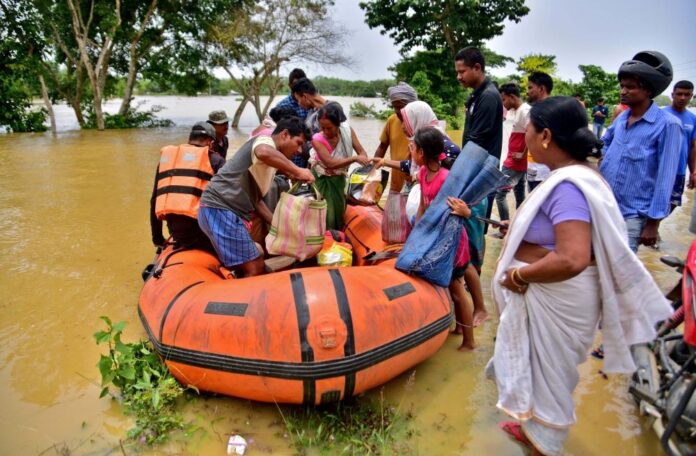NEW DELHI: More than 400,000 people in northeastern India have been hit by deadly floods triggered by pre-monsoon downpours, authorities said on Wednesday, as they brace for more heavy rain.
Rescue and evacuation efforts were ongoing as incessant rains and landslides affected communication lines, as well as road and railway networks in most of Assam state in the last few days.
At least eight people have been killed by the floods, according to local media reports.
“The total number of people impacted is around 4 lakh (400,000),” Gyanendra Dev Tripathi, chief executive at the Assam State Disaster Management Authority, told Arab News.
“Hopefully, we will be able to tackle this situation,” he added. “We are ready for the worst possible scenario.”
The flooding has been worst in the districts of Cachar and Hojai.
“In Hojai district alone, at least 100 villages are submerged, which means more than 50 percent of villages are under water. At least 40,000 to 50,000 people in this area are impacted,” Ashraful Amin, a social worker in the region, told Arab News.
He estimated that around 70 percent of the people were still trapped in the flood zone. The military has already joined the rescue operation.
“Since yesterday, we have been trying to reach out to the affected people on wooden boats,” he said. “The army has started rescuing people today.”
Landslides have cut off the southern part of the state from rail connectivity.
“We have 50 bridge points where landslides have damaged the tracks,” Sabyasachi De, spokesperson for North Eastern Frontier Railway, said. “These are unprecedented landslides, cloudbursts and flash floods. We have not seen anything like this so far.”
India’s weather agency has issued a red alert notice for Assam, as heavy rain is expected in the region for the next three days.
More rainfall is expected as monsoon downpours are yet to hit the region, R. K. Jenamani, a senior scientist at the India Meteorological Department, told Arab News.
“The havoc has been caused by flash floods. It’s not the normal monsoon,” he said. “The monsoon has yet to hit India.”

